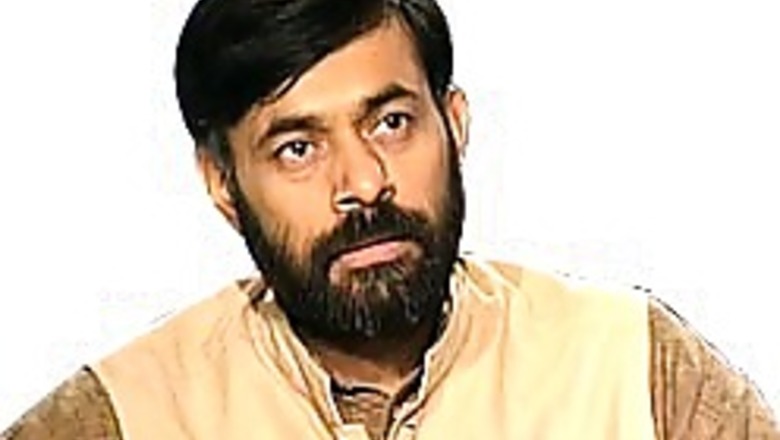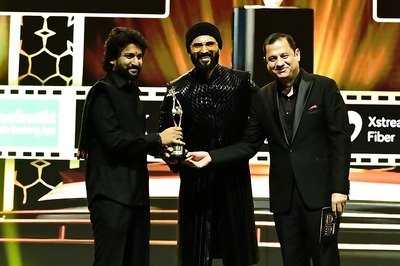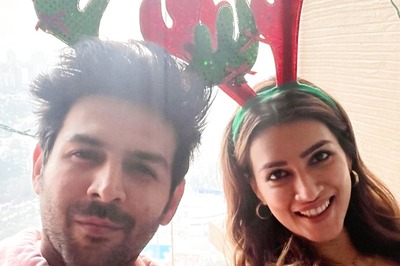
views
Exit poll forecasters have been proven wrong in the Karnataka Assembly elections. The BJP has won--a verdict which few forecasters saw coming.
Is exit poll forecasting an impossible task? Is it futile to predict election results in India?
In order to get answers to the above and more, IBNLive.com organised a chat with psephologist Prof Yogendra Yadav, Senior Fellow at the Centre for the Study of Developing Societies.Shakti: Hi Yogendra, Just wanted to say don’t get discouraged by the wrong predictions this time. Mistakes happen sometime. Sachin Tendulkar doesn't hit a century every time, he still is a great player. Cheers!! Shakti from ParisYogendra Yadav: Thanks, I am grateful for your patience and generosity.MNV, USA: Why are your surveys always pro-Congress? I think it's time for you to stop doing this business. You did this earlier in Gujarat and now in Karnataka. Don't try to influence people with your exit polls. People are smart now. Yogendra Yadav: I was about to call it a day and then I saw this question. I thought I must address this last question before I quit today. May I urge you not to draw such conclusion based on two polls? In any case what purpose would it serve (assuming that the purpose is to benefit the Congress) to show the Congress winning or ahead after the last vote is cast? May I urge all the viewers and readers to see polls for what they are, namely exercises to understand political behaviour? May I request you to address some of your questions to Prof Karandikar now? Thanks for taking us seriously enough to address your questions, anger and doubts. I hope to continue this dialogue. Bye for now.Ankit Desai: Are you really taking real-time voters as sample for your pre/post exit poll? You failed in Gujarat and now in Karnataka. While error of 2-4% can change the whole scenario, then how come you can make the same mistake twice? I think you are just taking general perception and going with average vote sharing thoughts. In Gujarat, it was anti-Modi wave and in Karnataka, 3 major parties, so a hung Assembly. Don't you?Yogendra Yadav: Ankit I can see why you think so. Can I invite you to the CSDS one day and see for yourself how much of effort goes into making every poll? And we retain the records of each poll, right or wrong. Do get in touch with me.Kevin: Is there any hope for two-party or three-party rule in India? When do you think regional parties will lose their appeal and when will the people start preferring national parties?Yogendra Yadav: I don’t share the assumption behind this question. I see no reason to believe that regional parties are a problem in our democracy. If you give it a thought you might see that they have contributed to the strength of our democracy.Akshay: Prof M N Srinivas did ethnography on a Karnataka village and discovered an original concept like the vote bank. With so much statistical prowess, what is the conceptual contribution of the contemporary Indian pollsters to Indian psephology?Yogendra Yadav: This is a fair criticism. Academic surveys of the Indian electorate have contributed much less to theorising than they should have. This applies to my own work. Incidentally I have written at length about the relationship of ethnography and survey research in a book called ‘Grassroots of Democracy’ edited by Prof A M Shah.Vamsi: I am from AP. Have you done any surveys recently in AP? If so, how is the situation?Yogendra Yadav: No we have not. On principle we never do anything confidential. If we ever do a survey you will get to know about it.Prashant Deshpande: Since the statistical surveys are repeatedly failing to predict the election outcome correctly, do you think that these armchair methods need to be complemented by a greater legwork and traditional journalistic research methods?Yogendra Yadav: I daresay a lot more leg work goes into polls than any single journalistic report. We must not take the failure of forecasts to be a reflection on the method of polling.
PAGE_BREAKRLK: Hi Yogendra, do you think that a probable JD(S)-Congress alliance can upset the BJP applecart in 2009 Lok Sabha elections?Yogendra Yadav: Is this the RLK that I know? A Congress-JDS alliance would no doubt hurt the BJP in 2009 Lok Sabha elections, but in the long-run it would make JDS irrelevant to state politics and BJP into a real all-Karnataka player. This is what happened to Janata Dal offspring in Rajasthan, Gujarat.Renu: What is the benefit of publishing surveys(Pre poll or Exit poll) to the people?Yogendra Yadav: If these are used as instruments of political analysis, then there is a great merit. Otherwise it can become a cheap gimmick.Bhaargav: How important is sample size for the accuracy of predictions?Yogendra Yadav: I believe my colleague and one of the most respected statisticians in the country, Prof Karandikar, is going to join the chat soon. You can pose this question to him.Janmejay Rai: Why is it that the results of your polls always show Congress getting more seats than the actual and the BJP less than actual. It happened in Gujarat and now Karnataka.Yogendra Yadav: Please do not say 'always' based on only two polls. Every survey showed BJP getting more seats than it did in UP. On balance exit polls have tended to over-estimate the BJP for it is stronger in urban areas.Biju: Will the delimitation process have a more profound impact on national politics from now on i.e. urban areas getting more representation?Yogendra Yadav: For one thing the urban poor will have better representation. But I do not see big gains for any one party or alliance.Sandeep Kumar: Let us leave the exit polls. Anybody can go wrong in predictions, how do you assess the current situation? Even though the BJP has about 100 seats, it’s still short of a majority. What might be the outcome according to you?Yogendra Yadav: My sense is that the BJP will be able to make up for this gap easily. And any attempt to deny power to the BJP will invite a serious popular wrath.Ashish Pathak: Yogendra ji, do you think Indian people are realising that coalition governments are inefficient and that they vote from the perspective? Do you think that the psyche of the Indian voter is changing?Yogendra Yadav: If that was the dominant mood, the BJP or the Congress would have got an overwhelming mandate. I think on the contrary, the Indian voter is more tolerant of the coalitions now than 10 years ago.Madhu: I think your prediction in the Mysore region was correct, except a few lost seats for JD(S). It also seems to be bit correct in Karavali region. Where did you go wrong for other regions?Yogendra Yadav: Our reliance on exit poll in the last phase was one but not the only reason for our erroneous judgment.Satyam: Dear Yogendra, I am a researcher at the Indian Institute of Science, Bangalore. I feel exit polls should be more based on mathematics. Seems nowadays in India exit polls are based more on emotions and every time looks biased. Why is it so?Yogendra Yadav: I agree with you that we need much more R&D in pollstering than is available today. I think (and have said so several times) that Indian 'psephology' is at an infant stage and so much of over-exposure may have done it some harm. My institute, CSDS, which is also an academic institute, has tried to improve the standards of survey research. The other part of forecasting, votes-seats conversion, is sheer mathematical modelling. And I do not know of many serious mathematician, except Prof. Karandikar, who has given it some thought and attention. It is time people like you took it seriously.
PAGE_BREAKRaja Ram Mohan Roy: Why was the error in exit poll? Is it due to the voter changing his decision according to circumstances or is due to the redrawn constituencies?Yogendra Yadav: I believe my colleague and one of the most respected statisticians in the country, Prof Karandikar, is going to join the chat soon. You can pose this question to him.Dheeraj: I think exit polls going wrong is good . If all exit polls are always correct, it would diminish the most important aspect of Indian elections, its unpredictability?Yogendra Yadav: Thanks for giving us something to cheer about!Ninad Joshi: You just now said that you don't reveal the outcome of the post-poll analysis till the last voter cast his vote. But with polls taking places over a period of time like 3 or 4 stages, surely the survey of first phase will have effect on second or third phase? Your comments please.Yogendra Yadav: It is our policy as much as possible not to do a programme in between different phases of election, precisely in order to avoid this kind of bias. Sometimes when the polling takes place in 5 or 6 phases as in UP, it becomes a necessary evil.R Bhaargav: On the face value which coalition would win if elections were to be held at the central government, NDA or UPA?Yogendra Yadav: My gut reaction: neither the NDA nor the UPA will be anywhere close to the majority.Simon: Is there any inverse proportion in growth of the BJP and the growth of caste-based parties? Except in Bihar, wherever there is a strong caste-based party, it appears like the BJP is weakening and vice-versa.Yogendra Yadav: This is true both for the BJP and the Congress.Sameer Bhagat: Where, according to you, did the exit poll prediction go wrong?Yogendra Yadav: I believe my colleague and one of the most respected statisticians in the country, Prof Karandikar, is going to join the chat soon. You can pose this question to him.Venkata Ratnam: Hello Prof.Yogendra, Nothing wrong in having exit polls. It tells the trends, swings and enriches the knowledge to the viewers about the region or state. I think this time your predictions went wrong due to urgency or competition from other channels and not having proper sample size. I guess you have gone with some assumptions of previous polls of Karnataka. Am I right? Yogendra Yadav: You are right in one respect. We had no 'history' data for Karnataka due to the new delimitation. So we had to make some assumptions about how votes will translate into seats. For that we relied upon our simulated results. That led us away from what finally turned out to be the real pattern. Competition was responsible for the error only in a small way: every channel tries to do a programme on the evening of the last day of voting. That puts artificial pressure and leaves little time for careful judgment.Rama: What is the use of doing pre-poll or post-poll survey? Any way we will come to know the result within couple of days. Why do we need to spend our energy & time in doing such survey and publishing the figures? And still not be sure about those numbers. The normal public won't get any value from this exercise. I don't know why all medias are interested in doing such survey. Instead, media can educate the public better, give the background of each of the contestants so that they can do a better job in selecting the candidates. Yogendra Yadav: You are absolutely right. Believe me, this is what I have been saying to my friends in the media for well over a decade. I would really want the election coverage to be more focussed about the issues and factors. And for that surveys can be the most invaluable asset. As it is practiced today, a viewer could well think that polling has become a gimmick. I would like to see the media use polls and survey as serious tools of political analysis rather than focus on seats forecast.
PAGE_BREAKDheeraj: Do past mistakes make an exit pollster vulnerable? For example pollsters overestimated the BJP in UP and compensated by underestimating BJP in Gujarat?Yogendra Yadav: Ideally it should not. I know that Prof Karandikar or I do not look at the past or what others have done.Garima: Don't you think Mr. Yadav that usually survey samples are urban-oriented and easy-to-reach places types; that’s why all kinds of polls go wrong?Yogendra Yadav: This is often true and may have been the reason behind the under-estimation of the BSP in UP. But this was not true in Karnataka. In any case our polling method ensures that we pick our sampling locations in a way that represents the profile of that area.Biju: Do you believe that the BJP can make inroads into other southern states now?Yogendra Yadav: The BJP already has made a small entry in AP and very marginally in Kerala and TN. As yet the structure of party competition does not allow the BJP to have a major breakthrough.Rajanikanth: While we welcome the change, do you think the BJP will keep up their promise and rule Karnataka for next 10 years?Yogendra Yadav: I see no reason as yet to believe that BJP would turn out to be much different from the previous Congress governments. But it is premature to pass a definite judgment.Ramkrish: Don’t you think exit polls affects the mind of the voter and therefore you should be more responsible in your prediction?Yogendra Yadav: Since we do not reveal our post/exit poll findings till after the last voter has cast her vote, there is no fear of any effect. What you say applies more to pre-poll surveys. And there your point is well taken. Although there is not much evidence of poll affecting anything other than the moral of the party workers, we still need to be very cautious and review every mistake very carefully.Fa Hein: One blunt question, Yogendra: Do exit polls serve any purpose other than raking in TRPs?Yogendra Yadav: To tell you the truth they don’t raise TRPs either. Ask Rajdeep! My own sense is that every channel loses money in every exit poll. I think channels do exit polls as a kind of marker that they take politics and elections seriously and that they have some value addition to make. As I said before I share the feelings of many of you that the whole ritual of exit poll needs to be revisited. I think pre and post election surveys are very useful tools of political analysis, proved they are not linked to one magical piece of forecast that turns out to be not so magical at the end.Praveen: In the history of Indian politics, exit polls were never even near to what was the actual result. Is it that people vote for someone and express it the other way, eventually misleading you guys?Yogendra Yadav: No Praveen, I think we make mistakes in choosing the sample and drawing conclusions from the poll findings. In some rare instances (UP in 2007 was one such case) there is systematic misreporting by those who had voted for the BSP but were shy to admit it to anyone. But that is a rare case.Janay: Hi Yogendra, can you please explain the basis of your conclusion that the BJP will not do as well as it was expected in the Mumbai-Karnataka region? Gujarat and Karnataka predictions have made us doubt about the credibility of the exit polls. Can you explain?Yogendra Yadav: I understand your suspicion. And yes, if we make a series of errors like these, we are bound to lose credibility. All I can do is to explain the source of error: the exit poll (in which it is difficult to control the sample) suggested that the surge of the BJP in the first two rounds had halted in the third one. That is what we reported.
PAGE_BREAKSreekanth.N: Hello Yogendra, do you blame your respondents for your fractured prediction or do you blame your research techniques? If either are wrong, then is it worth conducting future surveys? Or if both aren’t, then what is your opinion about Lok Sabha elections being influenced by state elections in which the Congress has lost?Yogendra Yadav: I firmly believe that it is we, pollsters and forecasters, who are to blame for any mistake. The Indian voter does not cheat the pollsters. Yes the question of future surveys should be debated seriously. I think the surveys are not aimed only for seats forecast. I tend to view seats forecast as a small (and hopefully avoidable) by-product of surveys. The basic purpose is to understand voting behaviour.Daksh Patel: I have been following your surveys since many years, and found that, when it was NDA rule at Centre, you were giving edge to them in any state election. And now, it's the UPA. Be it Gujarat, Bihar (first time), or Karnataka, your mistakes continue. Please increase the sample size. Your views?Yogendra Yadav: Most viewers and readers tend to mix one pollster with another. It so happened that we did very little forecasting during the 1998-2004 period. The few cases that I remember off-hand do not confirm what you say. For instance we predicted the 2003 Delhi election for Congress. We also predicted Modi landslide in Gujarat in 2002. In 1998 we wrongly projected that the BJP will win in MP but rightly said that the Congress was winning in Rajasthan. I don’t see the pattern that you mention.Sahadevan K K: Do you believe it is the end of an exit poll era because it is like announcement of forecast?Yogendra Yadav: This might be too rash a conclusion to draw. Yes this failure poses a serious challenge. But the fact is that not everyone got it wrong. And those who did would learn from it and try to do it better. I think we should separate the problem and errors of practice from the problems of method itself.

















Comments
0 comment